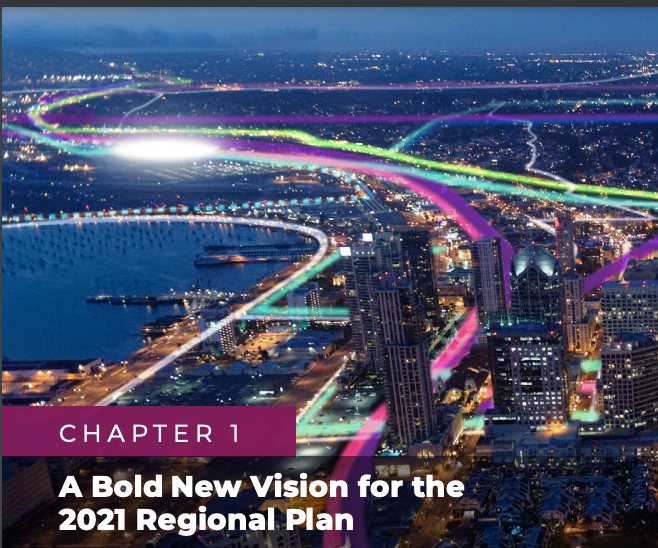In December, the San Diego Association of Governments, the regional body that oversees planning and development in southernmost California, passed its thirty-year regional transportation plan, called prioritizes projects that reduce, rather than increase, greenhouse gas emissions, that is: projects that encourage and improve conditions for walking, bicycling, and transit.
However, the most radical part of the proposal, a regional Vehicles Miles Traveled tax, was shelved after Democrats on the SANDAG Board joined Republican members to reject that part at the eleventh hour. Without the VMT tax, the question of how to pay for San Diego Forward is still very much a question mark. SANDAG had estimated it could raise $60 billion in revenue from such a charge - with half of that from the state and half from San Diego - to fund several large long-term projects in the plan.
But some of the San Diego County Board of Supervisors are still interested in exploring a VMT tax. The Supervisors are considering a proposed tax, with a twist: instead of taxing drivers directly, as the SANDAG proposal would have done, the Supervisors are considering taxing housing developers according to how many vehicle miles their tenants would be estimated to add to the regional transportation system. Right now the proposal would add an additional $10,000 to $22,000 per mile traveled by tenants. The longer the average drive, the more the developer would be taxed. The Board has held study sessions on a proposal, but has yet to commit to holding a vote on the plan.
This tax, if approved, wouldn’t cover all of the SANDAG region, but would provide a steady revenue stream for its urban center.
In addition to raising revenue, a VMT tax is worth pursuing because it could help accomplish several state and regional transportation-related goals. First, a VMT tax would allow the state to collect revenue more closely aligned with the amount of wear and tear that drivers cause to infrastructure - it’s closer to a “user fee” than the gas tax. As electric and hybrid vehicles become more common in California, the revenue generated by the state’s gas tax has been shrinking, but infrastructure isn’t getting younger or cheaper… to say nothing of the costs of retrofitting existing infrastructure to be safer for people to walk or take a bicycle.
Second, a VMT tax on new housing would be a disincentive to build sprawl and “edge city” housing that tends to increase travel times and VMT, and would encourage more housing to be built close to job centers.
Third, funds from the San Diego County tax would mostly go to transit and active transportation projects, with most of the remaining funds going towards transit operations and repair projects.
Opponents of the VMT tax argue that, given the state’s housing and affordability crisis, now is a bad time for anything that pushes up the cost of housing. Republican Supervisor Jim Desmond is making the rounds on local media attacking the Democrat majority on the Board for raising the cost of housing to fight “climate change.” (Scare quotes are his.)
As the Board moves forward on the proposal, Streetsblog will continue its coverage.






